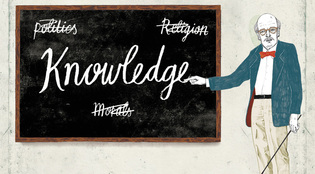 loading
loading
ForumEducation: the deflationary viewTeaching without preaching. Stanley Fish ’62PhD, Davidson-Kahn Distinguished University Professor at Florida International University, writes the "Think Again" blog for the New York Times. This essay is adapted from his forthcoming book, Save the World on Your Own Time (Oxford University Press).  Barry FallsView full imagePick up the mission statement of almost any college or university, and you will find claims and ambitions that will lead you to think that it is the job of an institution of higher learning to cure every ill the world has ever known: not only illiteracy and cultural ignorance, which are at least in the ballpark, but poverty, war, racism, gender bias, bad character, discrimination, intolerance, environmental pollution, rampant capitalism, American imperialism, and the hegemony of Wal-Mart. Yale College's statement starts well by promising to seek students "of all backgrounds" and "to educate them through mental discipline," but then mental discipline turns out to be instrumental to something even more valuable, the development of students' "moral [and] civic . . . capacities to the fullest." I'm all for moral and civic capacities, but I'm not sure that there is much I or anyone else could do as a teacher to develop them. Moral capacities (or their absence) have no relationship whatsoever to the reading of novels, or the running of statistical programs, or the execution of laboratory procedures, all of which can produce certain skills, but not moral states. Civic capacities -- which mean, I suppose, the capacities that go along with responsible citizenship -- won't be acquired simply because you have learned about the basic structures of American government or read the Federalist Papers (both good things to do). You could ace all your political science and public policy courses and still drop out and go live in the woods or become the Unabomber. So what is it that institutions of higher learning are supposed to do? My answer is simple. College and university teachers can (legitimately) do two things: (1) introduce students to bodies of knowledge and traditions of inquiry that had not previously been part of their experience; and (2) equip those same students with the analytical skills -- of argument, statistical modeling, laboratory procedure -- that will enable them to move confidently within those traditions and to engage in independent research after a course is over. I'm not saying that there is no connection at all between the successful practice of ethical, social, and political virtues and the courses of instruction listed in the college catalogue; it's always possible that something you come across or something a teacher says may strike a chord that sets you on a life path you might not otherwise have chosen. But these are contingent effects, and as contingent effects they cannot be designed and shouldn't be aimed at. (It's not a good use of your time to aim at results you have only a random chance of producing.) Nor am I saying that academic work touches on none of the issues central to politics, ethics, civics, and economics; it is just that when those issues arise in an academic context, they should be discussed in academic terms; that is, they should be the objects of analysis, comparison, historical placement, etc.; the arguments put forward in relation to them should be dissected and assessed as arguments and not as preliminaries to action on the part of those doing the assessing. The action one takes (or should take) at the conclusion of an academic discussion is the action of rendering an academic verdict, as in "that argument makes sense," "there's a hole in the reasoning here," "the case is still not proven." These and similar judgments are judgments on craftsmanship and coherence. The judgment of whether a policy is the right one for the country is not appropriate in the classroom, where you are (or should be) more interested in the structure and history of ideas than in recommending them (or dis-recommending them) to your students. Recommending them is what you do when you are a parent, or a political activist, or an op-ed columnist, all things you may be when the school day ends, but not things you should be on the university's or state's dime. It might be objected that while it may be easy to remain within academic bounds when the debate is about the right interpretation of Paradise Lost, the line between the academic and the political has been blurred before the discussion begins when the subject is ethics and students are arguing, for example, about whether stem cell research is a good or bad idea. But students shouldn't be arguing about whether stem cell research is a good or bad idea. They should be studying the arguments various parties have made about stem cell research. Analyzing ethical issues is one thing; deciding them is another, and only the first is an appropriate academic activity. The view I am offering of higher education is properly called deflationary; it takes the air out of some inflated balloons. It denies to teaching the moral and philosophical pretensions that lead practitioners to envision themselves as agents of change or as the designers of a "transformative experience," a phrase I intensely dislike. I acknowledge a sense in which education can be transformative. A good course may transform a student who knew little about the material in the beginning into a student who knows something about it at the end. That's about all the transformation you should count on. Teaching is a job, and what it requires is not a superior sensibility or a purity of heart and intention -- excellent teachers can be absolutely terrible human beings, and exemplary human beings can be terrible teachers -- but mastery of a craft. Teachers who prefer grandiose claims and ambitions to that craft are the ones who diminish it and render it unworthy.
The comment period has expired.
|
|